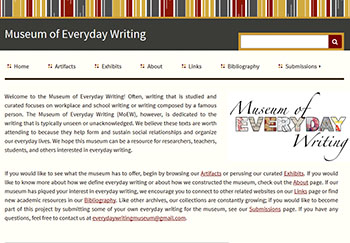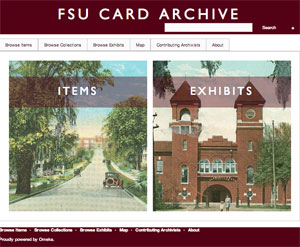Collaborations | Rhetoric and Composition
Research and Scholarship
Rhetoric and Composition faculty and graduate students are active within the discipline in a number of ways, including through the dissemination of publications and presentation of papers, projects, and posters at international, national, and regional conferences. Graduate students in the program are purposefully mentored to participate in disciplinary conversations and to collaborate on scholarly and pedagogical projects.
Publications
Faculty frequently collaborate with one another and with students and alumni in the program. Here is a sampling of some faculty-student and faculty-alumni collaborations within the program:
- Tarez S. Graban and Michael J. Healy. “The Promise(s) and Peril(s) of Big Data: Historiography, Data Feminism, and Tracing Women of Color.” In K.J. Rawson, et al eds. Rhetorica Rising: Advancing Feminist Rhetorical Methods and Methodologies. U of South Carolina P, 2025.
- Amory Orchard, Michael Neal, Ashleah Wimberly, and Amanda Ayers. "Open-Media Assignment Design to Address Access and Accessibility in Online Multimodal Composition." In Amy Cicchino and Troy Hicks, eds., Better Practices: Experts Explain How They Teach Writing Online. WAC Clearinghouse, 2024.
- Michael Neal, Katelyn Stark, Amy Cicchino, Michael Healy, and Kamila Albert. "Institutional Matters: The Localized Conditions of WPA Labor." In Leigh Graziano, Kay Halasek, Susan Miller-Cochran, Frank Napolitano, and Natalie Szymanski, eds., Making Administrative Work Visible: Data-Driven Approaches to Understanding the Labor of Writing Program Administration. Utah State UP, 2023, pp. 185–202.
- Kathleen Blake Yancey, Sonja Andrus, Matthew Davis, Sharon Mitchler, Liane Robertson, Kara Taczak, Howard Tinberg, and Tanner WouldGo. "Readiness to Learn: Variations in How Students Engage with the Teaching for Transfer Curriculum." College Composition and Communication, vol. 75, no. 2, 2023, pp. 248–79.
- Jennifer Enoch, Megan Keaton, Ellen Cecil-Lemken, and Travis Maynard. “Internships as Techne: Teaching the Archive through the Museum of Everyday Writing.” In Tarez S. Graban and Wendy Hayden, eds., Teaching through the Archives: Text, Collaboration, Activism. Southern Illinois UP, 2022, pp. 107–20.
- Tarez S. Graban and Meghan Velez. “Bringing Comparative Methodologies into the U.S.-Centric Major: Examining ‘Technology’ and ‘Text’ for Cross-Cultural Learning in English Studies.” In Keith Lloyd, ed., The Routledge Handbook for Comparative World Rhetorics. Routledge, 2020, pp. 317–30.
- Kathleen Blake Yancey, Matt Davis, Liane Robertson, Kara Taczak, and Erin Workman. "Writing across College: Key Terms and Multiple Contexts as Factors Promoting Students’ Transfer of Writing Knowledge and Practice." The WAC Journal, 2018, pp. 44–66.
- Kristie Fleckenstein, Scott Gage, and Katherine Bridgman. "A Pedagogy of Rhetorical Looking: Atrocity Images at the Intersection of Vision and Violence." College English, vol. 80, no. 1, 2017, pp. 11–34.
- Stephen McElroy, Jennifer Wells, Andrew Burgess, Jeff Naftzinger, Rory Lee, Josh Mehler, Jason Custer, Aimee Jones, and Joe Cirio. "A Space Defined: Four Years in the Life of the FSU Digital Studios." In Rusty Carpenter, Dickie Selfe, Shawn Apostel, and Kristi Apostel, eds. Sustainable Learning Spaces. CCC Digital Press, 2017.
- Michael Neal, Katherine Bridgman, and Stephen McElroy. "'Many Happy Returns': Student Archivists as Curators of Public Memory." Laurie Grobman and Jane Greer, eds., Pedagogies of Public Memory: Teaching Writing and Rhetoric at Museums, Archives, and Memorials. Routledge, 2016, pp. 117-31.
Editorial Work
Editorial work—which includes editing journals, editing book collections and special issues of journals—is critical to the publication and circulation of disciplinary scholarship. Here are selected highlights of editorial work conducted by faculty, graduate students, and alumni from FSU Rhetoric and Composition:
- Matt Davis and Kara Taczak Editors of College Composition and Communication, 2025-2029.
- Hui Wu and Tarez Samra Graban, eds. Global Rhetorical Traditions. Parlor Press, 2023.
- Scott Gage and Kristie S. Fleckenstein, eds. Violence in the Work of Composition: Recognition, Intervention, Amelioration. Utah State UP, 2022.
- Tarez Samra Graban and Wendy Hayden, eds. Teaching through the Archives: Text, Collaboration, Activism. Southern Illinois UP, 2022.
- Tarez Samra Graban, Paul Marty, Allen Romano, and Micah Vandegrift: guest editors Digital Humanities Quarterly Special Issue Invisible Work in the Digital Humanities, vol. 13, no. 2, 2019.
- Kathleen Blake Yancey, Rita Malenczyk, Susan Miller-Cochran, and Elizabeth Wardle, eds. Composition, Rhetoric, and Disciplinarity. Utah State UP, 2018.
- Kathleen Blake Yancey and Stephen J. McElroy, eds. Assembling Composition. National Council of Teachers of English, 2017.
- Kathleen Blake Yancey, ed. A Rhetoric of Reflection. Utah State UP, 2016.
- Tarez Samra Graban and Shirley K. Rose: guest editors Peitho Special Issue The Critical Place of the Networked Archive, vol. 17, no. 1, 2014.
- Kathleen Blake Yancey, Emily Baker, Scott Gage, Ruth Kistler, Rory Lee, Natalie Syzmanski, Kara Taczak, and Jill Taylor: guest editors Across the Disciplines Special Issue Writing across the Curriculum and Assessment, 2009.
- Kathleen Blake Yancey: Editor of College Composition and Communication, 2009-2014.
- Kristie S. Fleckenstein and Linda T. Calendrillo: Editors of The Journal of the Assembly for Expanded Perspectives on Learning (JAEPL), 2001–2009.
The Conference Scene
Presenting papers, attending sessions, and participating in roundtable and special interest groups at professional conferences are all vital to our academic work as well. FSU faculty and graduate students often collaborate on proposals and/or present together at conferences around the country. In the past two years, members of the FSU Rhetoric and Composition have presented over 40 times at conferences ranging from the Conference on College Composition and Communication, Computers and Writing, Council of Writing Program Administrators, Feminisms and Rhetorics, International Writing Center Association, and Rhetoric Society of America, among many others.
Archival Scholarship
Archival research includes work with primary sources that either seeks data from archival records, collecting and curating records for the archives, or some combination of these activities. While traditional archiving is often thought to be the providence of libraries, museums, government, and religious institutions, Rhetoric and Composition has undergone what some call an "archival turn." The Rhetoric and Composition Program hosts two home-grown archival collections—The Museum of Everyday Writing and the FSU Card Archive. In addition, several faculty and graduate students are involved in an array of archival research, including Tarez Graban's Linked Women Pedagogues Project.
The Museum of Everyday Writing (MoEW)

The Museum of Everyday Writing (MoEW) is dedicated to writing that is often unseen or unacknowledged: everyday writing, or that which is composed by ordinary people in non-academic and non-professional contexts and which represents the literacy practices through which ordinary people maintain relationships and structure their lives. These materials complement and enrich the more traditional archives of academic, literary, or professional writing or writing that is composed by a famous person. Co-founded by Jennifer Enoch, Megan Keaton, and Sarah Marshall, the Museum provides a space where everyday writing--which includes a variety of written, visual, and aural texts from letters to graffiti to scrapbooks—can be curated and studied. The Museum houses artifacts that can be used for research in everyday writing and literacy studies, multimodality, materality, visual design, and many other areas. In addition to the artifacts themselves, the MoEW hosts exhibits, composed by Museum contributors and interns, that serve as examples of scholarly research based on everyday writing.
The FSU Card Archive [on hiatus]
The FSU Card Archive is a collection of over 5500 postcards and over 200 exhibits, created mostly by student archivist. Co-founded by Stephen McElroy, Katie Bridgman, and Michael Neal in 2011, this archive is a site for research into visual rhetoric, material productions of everyday writing, social politics, and representation. Each postcard re-presents a moment in time, a slice of history that reflects the cultural values, the available technologies for printing and circulation of texts, and the language of a particular time and place. Often overlooks as unimportant texts, we believe examples of common texts like postcards can serve as important historical and cultural documents in part because they were accessible and used widely, especially in the early 20th century: the golden age of postcards. The archive also allow visitors to curate their own exhibits to be published within the site for future visitors. Anyone can visit the site (located at https://english3.fsu.edu/fsucardarchive/) and peruse the contents. If individuals or classes are interested in building exhibits and adding content to the site, please contact Michael Neal (mrneal@fsu.edu) for permissions. The theory and reflections on creating the archive were published in "Making Meaning at the Intersections: Developing a Digital Archive for Multimodal Research" by Neal, Bridgman, and McElroy in Kairos 17.3., which won the 2014 Computers and Composition Michelle Kendrick Outstanding Digital Production/Scholarship Award.
Linking Women's Pedagogy (LWP)
Linking Women's Pedagogy (LWP)— formerly known as the Linked Women Pedagogues Project—was conceived by Tarez Samra Graban in 2011 ... as a concept for moving feminist historiography in rhetoric and writing studies beyond building digital exhibits and recovery models that favor static  locations, figures, and texts. It was inspired by her interests in data networks and the digital humanities, which favor historical methodologies that look for significant activity in knowledge circulation, rather than in traditionally defined locations, texts, or events. In the absence of women's published or publicly circulating texts, how can rhetorical historians recover their pedagogical and administrative work, and what can that recovery teach us about our disciplinary histories in rhetoric, writing, literacy, and communication? LWP answers that question by tracing their intellectual work through the migration of people, motives, texts, curriculum, and ephemera—all as reflected in institutional and archival metadata. LWP is the prototype for a digitally crowd-sourced tool intended to help preserve, analyze, and make accessible information about unprocessed, obscure materials written by minoritized women pedagogues that have influenced the development of rhetorical studies since the 1890s. If you would like to join the collaboration, have data sets to contribute, or have any questions about what kinds of data to contribute—large or small—please feel free to contact Tarez directly at tgraban@fsu.edu. For more about the development of this project, see "From Location(s) to Locatability: Mapping Feminist Recovery and Archival Activity through Metadata" in College English 76.2 (November 2013).
locations, figures, and texts. It was inspired by her interests in data networks and the digital humanities, which favor historical methodologies that look for significant activity in knowledge circulation, rather than in traditionally defined locations, texts, or events. In the absence of women's published or publicly circulating texts, how can rhetorical historians recover their pedagogical and administrative work, and what can that recovery teach us about our disciplinary histories in rhetoric, writing, literacy, and communication? LWP answers that question by tracing their intellectual work through the migration of people, motives, texts, curriculum, and ephemera—all as reflected in institutional and archival metadata. LWP is the prototype for a digitally crowd-sourced tool intended to help preserve, analyze, and make accessible information about unprocessed, obscure materials written by minoritized women pedagogues that have influenced the development of rhetorical studies since the 1890s. If you would like to join the collaboration, have data sets to contribute, or have any questions about what kinds of data to contribute—large or small—please feel free to contact Tarez directly at tgraban@fsu.edu. For more about the development of this project, see "From Location(s) to Locatability: Mapping Feminist Recovery and Archival Activity through Metadata" in College English 76.2 (November 2013).

